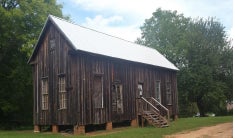Grant awarded to preserve historic Lowndesboro school
Published 10:23 am Thursday, August 5, 2021
|
Getting your Trinity Audio player ready...
|
The Elmore Bolling Initiative has been awarded a grant of $236,313 from the National Park Service’s African American Civil Rights Grant Program for the restoration and preservation of the historic Lowndesboro School. This grant is one of 53 projects in 20 states (including 7 others in Black Belt Alabama) that the NPS will fund to help preserve sites and history related to the African American struggle for equality.
“I’m thankful to Congresswoman Terri Sewell for her support in obtaining this significant grant for the preservation of the 19th Century Freedmen’s Bureau Lowndesboro School,” said Josephine Bolling McCall, president of The Elmore Bolling Initiative.
“Just as this school was a beacon of hope for the first post-slavery generation of Black children when it was founded in 1868 by Dr. Mansfield Tyler, a former slave, it is my hope that the investment in our work by the NPS will produce a signature effort to not only restore and preserve the history and memories of this era but also to create a concrete reminder of our
important and honorable past. By the 1960s, schools for African-American children, starved for funds by school districts controlled by whites, were systematically demolished. But the Lowndesboro School survived and we are now honored that this grant will allow us to tell the long history of African Americans striving for education in Lowndes County and throughout the South,” said McCall.
“This investment by NPS in our preservation project will create opportunities for educational, economic and cultural advancement in Lowndes County and will also serve to revitalize this region by promoting further investments and by bringing a lost history to future generations of Americans,” McCall added.
Part of that lost history is the murder of McCall’s father in 1947. “On the day my father was lynched in Lowndes County, my brothers and sister and I attended classes at the Lowndesboro School,” said McCall. Her father was shot to death by a group of white men, according to news accounts at the time, but the shooters were never prosecuted and no one was indicted or convicted for his murder.
Founder of the Lowndesboro School, Dr. Mansfield Tyler, was an Alabama state legislator, founder of Selma University, and leader of a Reconstruction era group known as the Lowndesboro Colored Education Association. The Association initially housed the school in the First Baptist Church of Lowndesboro and built the separate school building that survives today on its current site in c.1883. The school is a one-story two-room structure with a gabled roof and pine board-and-batten construction.
The Lowndesboro School was closed by federal order in 1967. In 2011, the building was donated to The Elmore Bolling Initiative by Lucius and Myrtle K. Evans, who owned the land on which it sits. TEBI petitioned for and achieved recognition from the National Register of Historic Places for the school in 2014. The Lowndesboro School is the only example of a 19th century rural school for “colored” children identified by the Alabama Historical Commission.
One of the luminaries in the world of preservation of historic African American sites, Brent Leggs of the National Trust for Historic Preservation, makes the case for why projects like the preservation of The Lowndesboro School are essential for American society: “It’s exceptionally important that the Black experience be preserved and visible upon the American landscape. It’s important that we tell these stories that are overlooked to equitably understand what it means to be an American. It’s important that we invest in historic Black communities to stimulate revitalization and to foster interest in places that today seem to exist without history”.






